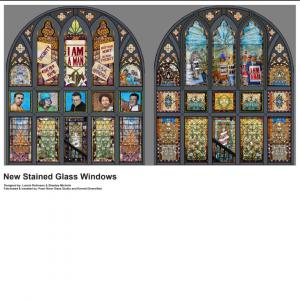MEMPHIS’ HISTORIC CLAYBORN TEMPLE TO UNDERGO CATALYTIC RESTORATION
Civil Rights Landmark Undergoes $25 Million Renovation, Releases Renderings, Programming, and Plans for the Future
MEMPHIS, TENNESSEE, UNITED STATES, February 19, 2024 /EINPresswire.com/ -- Memphis’ iconic Clayborn Temple, a historic civil rights landmark and organizing headquarters of the Sanitation Workers Strike of 1968, is undergoing a multi-phase transformative renovation that will not only preserve its historic significance but also usher in a new era of vitality for this cultural gem and the surrounding community. Today, Historic Clayborn Temple has released design renderings to the public, offering a glimpse into the future transformation of this iconic landmark, which is Black-owned and Black-led. The five-year-long, multi-phased renovation is expected to cost a total of $25 million, funded by private donors. Slated for completion in 2026, Historic Clayborn Temple will celebrate its grand reopening and enduring legacy with a ceremony.“As an important sacred space in American history, in Black history, and in Memphis history, Historic Clayborn Temple has an opportunity to bring people together in a place of nurturing, peace and love,” said Anasa Troutman, Executive Director of Historic Clayborn Temple. “With healing arts and culture programming, a museum that honors the history of the building, and community outreach initiatives that support economic justice, we’re committed to reclaiming a sacred space for the community, and ensuring that the resilient spirit of this iconic landmark continues to inspire generations yet to come."
A stately Romanesque Revival church just south of Beale Street, Clayborn Temple began life with an all-white congregation in 1892 as Second Presbyterian. In 1949, the building was sold to an African Methodist Episcopal congregation for $100,000. Renamed Clayborn Temple, the church became a haven and assembly point for social, cultural, spiritual, and political expressions for Memphis’s African American communities. Because of its reputation in the community and proximity to City Hall, Clayborn was chosen as the organizing headquarters for The Sanitation Workers’ Strike of 1968, Dr. Martin Luther King Jr.'s last campaign. The campaign’s iconic “I AM A MAN” signs were made daily in Clayborn’s basement and have since become a universal symbol for human rights and dignity.
Key features of the restoration include:
> Original Stained Glass Restoration: The restoration and reimagining of the church’s stained-glass windows is a critical component in the overall building restoration. Designed by Memphis-based visual artists, Sharday Michelle and Lonnie Robinson, the reimagined windows tell the story of the Sanitation Workers’ Strike, including five panes that depict major people involved in the strike: Larry Payne, Cornelia Crenshaw, Rev. James Lawson, Maxine Smith, and T.O. Jones.
> Grand Pipe Organ Restoration: Through a highly specialized, complex and meticulous process involving the collaboration of craftsmen and musicians, the original 3,000 pipe grand organ will be dismantled, removed and transported to a restoration specialist in upstate New York. There, it will be inspected, cleaned and authentically restored to historical accuracy before it is reassembled and reinstalled.
> Museum Building: A new build on the property will house the museum, an interactive exhibit about the history of Clayborn Temple and the role of the church’s congregation in the Civil Rights Movement. Curated to maximize audience experiences and accessibility, this space promises to integrate digital engagements and modern technologies.
During the renovation, Historic Clayborn Temple remains a vital heartbeat in South Memphis today with community initiatives including:
> Artists in Residence: A residency program designed to foster creative expression and professional growth for emerging and established Memphis-based artists, including a living wage stipend and resources to bring their projects to life.
> Leadership Council: Appointed community members who are committed to restorative economics in Memphis, specifically exploring the needs and impact of inequality on the surrounding communities.
> The Council presents In This Place: A curated season of events honoring the Sanitation Workers Strike of 1968, including storytelling and community conversations that invite innovation.
> I Am The Story of Historic Clayborn Temple & the Sanitation Workers’ Strike of 1968: A curated collaboration with the National Trust for Historic Preservation, the traveling, 10 panel exhibit illustrates the heritage of the sacred space that galvanized the Civil Rights Movement in Memphis.
> Spirit of Memphis: Screenings of the award-winning feature documentary, the Spirit of Memphis, a narrated love letter to the city, with exclusive interviews highlighting the role that the Sanitation Strike, Historic Clayborn Temple, and Memphis played in America's complicated history.
From economic activity to cultural exploration, to discover more about the unique culture and community at the epicenter of soul visit: www.WeAreMemphis.com.
About Historic Clayborn Temple
Historic Clayborn Temple is a Memphis, Tennessee-based 501(c)(3) non-profit organization, rooted in the work of historic preservation, the keeping of material culture, community empowerment, and restorative economics. We engage in cultural strategy inspired by Martin Luther King, and the participants of the Sanitation Workers’ Strike of 1968. We embody a declaration of the humanity and dignity of Black, poor, and working-class people and continue their legacy of advancing human understanding for all through storytelling, engagement, and practice. Located just south of Beale Street in Memphis, Tennessee, Clayborn Temple began its life in 1892 as Second Presbyterian Church. In 1949, the church was sold to an AME congregation, who changed the property name to Clayborn Temple in honor of a local bishop. During the Sanitation Workers' Strike of 1968, Martin Luther King's last campaign, civil rights and labor activists organized together inside Clayborn Temple. The campaign's iconic "I AM A MAN" signs were made daily in the Temple's basement and have since become a universal symbol for human rights and human dignity. Officially named a National Treasure, city leadership, community members, and preservationists alike are all committed to keeping Clayborn Temple alive, preserving its legacy, and bringing the visions for its future to fruition. For more information, visit www.Clayborn.org.
About Memphis Brand:
A first of its kind non-profit centered at the intersection of mission and marketing, Memphis Brand is firmly dedicated to elevating Memphis as a contemporary epicenter of inclusivity, creativity and innovation. A collaboration of diverse individuals and organizations, Memphis Brand is captivating audiences locally and globally, to create catalytic positive change for all.
www.WeAreMemphis.com
Brittney Adu
Memphis Brand
badu@memphisbrand.org
Visit us on social media:
Facebook
Twitter
Instagram
TikTok
Legal Disclaimer:
EIN Presswire provides this news content "as is" without warranty of any kind. We do not accept any responsibility or liability for the accuracy, content, images, videos, licenses, completeness, legality, or reliability of the information contained in this article. If you have any complaints or copyright issues related to this article, kindly contact the author above.



